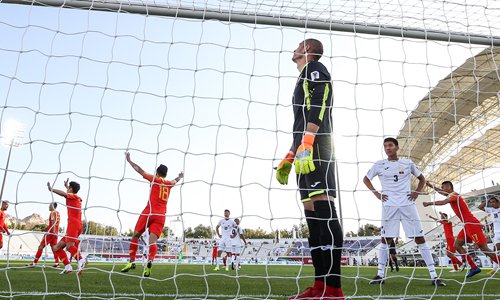SPORT / SOCCER
Observers call for youth development after blow to Tokyo Olympics prospects for China’s major sports

The Chinese national soccer team beat Kyrgyzstan 2-1 at the 2019 Asian Football Confederation Asian Cup. Photo: VCG
Watched by the leaders of the Chinese Football Association (CFA), the China national U23 soccer team were knocked out by defending champions Uzbekistan on Sunday from the AFC U23 Championship with a result of 0-2.
The defeat also suggests the team’s hope of participating in the 2020 Tokyo Olympics may be over. Many netizens and fans said they felt not only disappointment but also “habitual numbness.” China now ranks at the bottom in Group C after two straight loses.
China’s men’s national volleyball team lost the ticket to the Tokyo Olympics on the same day. Considering the underperforming men’s national basketball team face a highly competitive wild card tournament to secure the ticket to Tokyo, the prospects for China’s three most important sports are dim.
Sports fans and observers called for sports governing bodies to stress the development of youth talent, especially in soccer, as the national soccer team has a history of failure in qualifying for the Olympic Games. It has had only two Olympic experiences – the 1988 Summer Olympics in Seoul and the Beijing Games in 2008.
The topic of “Team China failed to qualify for Tokyo Games” became a hot trend on social media with more than 23 million views on Twitter-like Sina Weibo. Players and governing bodies like the CFA were severely blamed by some furious netizens who see China’s football as “hopeless.”
In an online poll initiated by Sina Sports on Weibo, 9,200 out of 15,000 participants said that Chinese footballers are incompetent.
A senior CFA official, who asked for anonymity, told the Global Times that the bitter defeat shows the poor working effects of youth academies in the past decade.
“The defeat will promote reform. The CFA will respect and follow the law of soccer development and pay close attention to youth development and expansion of the soccer population,” the official said on Monday.
The CFA on December 31 launched a range of new policies to regulate domestic leagues and boost the competitiveness of the national team, after a wave of public wrath about China's 2-1 defeat to Syria in a 2022 FIFA World Cup qualifier in mid-November. Amid the new policies, salary caps and development of young talents are primary among the fans' concerns.
According to the new policies, salaries of young players who signed contracts after 2020 January 1, shall not exceed 300,000 euros (pre-tax). The CFA explained the move is aimed at encouraging young footballers to play hard and prove that they deserve a better salary.
The U23 policy has also been updated as it requires at least one U23 footballer in each club make to make an appearance in every league match. A U23 league will be set up as well, which allows participation of young players who are playing with the first team.
“We want the domestic leagues to become a healthy and stable platform for cultivating young talent,” said the CFA official, noting that patience will be needed.
Ma Dexing, a senior sports commentator, said that being knocked out is predictable as Chinese players were competing with stronger opponents in the group. Luo Ming, another senior commentator with Titan Sports, said the level of Chinese youth training is low. Although the U23 policies that started in 2017 boosted appearances for young talent, the players did not really get a chance to cope with problems on the field as they were always covered by mature teammates.
It was a double whammy for Chinese sports fans on Sunday as China’s men’s national volleyball team were defeated by Iran, who successfully claimed the championship in the Asian Volleyball Confederation (AVC) Men's Tokyo Volleyball Qualification for the Tokyo Olympics.
China’s men’s national basketball team is also on the edge of being knocked out from the Tokyo Games after a poor performance in the FIBA World Cup in September 2019. It must now beat the likes of Slovenia and Russia in a tournament next year.




